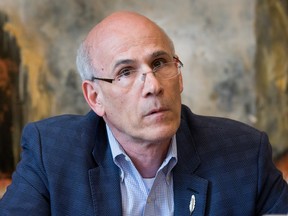The Global Government Forum report interviewed the top public servants from 12 countries.

Article content
A recent report analyzing what makes a strong public service found that governments worldwide are grappling with building respect between ministers and bureaucrats. A former clerk of the Privy Council and an expert on parliamentary democracy and governance say the issue is prevalent in Canada.
The Global Government Forum report, “Making Government Work: Five pillars of a modern, effective civil service“, interviewed the top public servants from 12 countries, including Canada’s John Hannaford, to pinpoint five pillars of a successful civil service. One of those pillars involved a healthy relationship between ministers and senior officials — something Michael Wernick, a former clerk of the Privy Council, said was an “enduring” issue in Ottawa.
Advertisement 2
Story continues below
Article content
“The best you get is benign neglect and the worst you get is spirited hostility,” he said of how politicians treat public servants.
The report said its interviews with international leaders revealed “the growing challenge of aligning the immediate demands of political agendas with the long-term stewardship entrusted to civil servants” and highlighted “a lack of trust and understanding among ministers about the civil service’s fundamental role.”
While Hannaford declined a request for an interview, a report by deputy ministers on public service values and ethics prepared for the clerk highlighted the division between public servants and politicians. It said that participants from more than 90 conversations across the public service raised concerns about political interference in the public service.
“Some participants expressed concern with their ability to maintain political neutrality when dealing with political staff in a minister’s office,” the report said. “Striking a balance between political neutrality and providing expert advice, as well as the faithful implementation and delivery of programs and policies, can be challenging.”
Advertisement 3
Story continues below
Article content
It noted that there had been changes in the relationship between ministers and their offices given the “significant growth in political staff across the system.”
Wernick said the challenge of relationships between ministers and officials was not unique to the current government.
“There’s not really any sustained interest in the public service,” Wernick said, noting a pattern under both Liberal and Conservative governments. “I tabled four annual reports on the public service as clerk, and the number of times I was invited to a parliamentary committee to talk about it over those years was zero.”
Politicians, he said, are only interested in the public service when there’s a scandal.
“I’m sure there’s lots of cases every day and every week where ministers and their departments work effectively together … but the broad trend line seems to be that there’s an erosion of that relationship and the more populist sort of style of politics is about going for conflict.”
Wernick said the lack of respect between politicians and officials was most apparent during Parliamentary committee meetings.
Advertisement 4
Story continues below
Article content
“This incredibly disrespectful treatment of witnesses of parliamentary committees is just one symptom,” Wernick said, adding that officials were often “used as props” for social media posts and fundraising videos.
The report said one solution could be better training for ministers, political staff and officials to “bridge knowledge gaps” between their operations.
“If we were serious, there’d be an ongoing professional development, support for ministers and MPs and staffers,” Wernick said, adding that public servants could learn how to better support politicians and staffers.

Lori Turnbull, a professor in Dalhousie University’s faculty of management, whose research focuses has been on parliamentary democracy and governance, said the relationship between politicians and officials was always affected by the political climate at the time, noting that the current government is almost nine years old and has seen a lot of change in leadership.
“People know that this government is not doing well in the polls and, unless all the polls are getting it wrong, whenever this election is held, Pierre Poilievre is going to form a government,” Turnbull said, adding that in Canada there’s an expectation for the public service to be loyal to the government of the day until the moment it changes.
Advertisement 5
Story continues below
Article content
“Over time, there’s always going to be chafing in that relationship and there’s always going to be some trickiness when you get to that late stage of a government’s life where conflicts are going to come up, there’s going to be trust that is broken.”
Turnbull said the government’s reliance on contracting out advice and services was likely also causing distrust among public servants.
“Not that they ever have a monopoly on giving advice to the government, but it seems like this government has really gone out of its way to pull in advice and support from non-public-service entities,” Turnbull said. “Those sorts of things send a message to the public service that, ‘We don’t want you as you are.’”
Turnbull said ministers, political staff and senior public servants needed to be better educated when they took on a role on what it meant to have a healthy tension between the two sides based on trust.
“Our system needs trust or else it won’t work, but now we’re seeing that trust break down,” Turnbull said.
Our website is your destination for up-to-the-minute news, so make sure to bookmark our homepage and sign up for our newsletters so we can keep you informed.
Recommended from Editorial
Article content


Comments